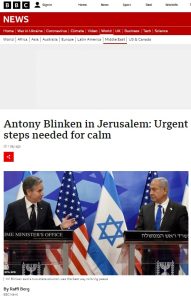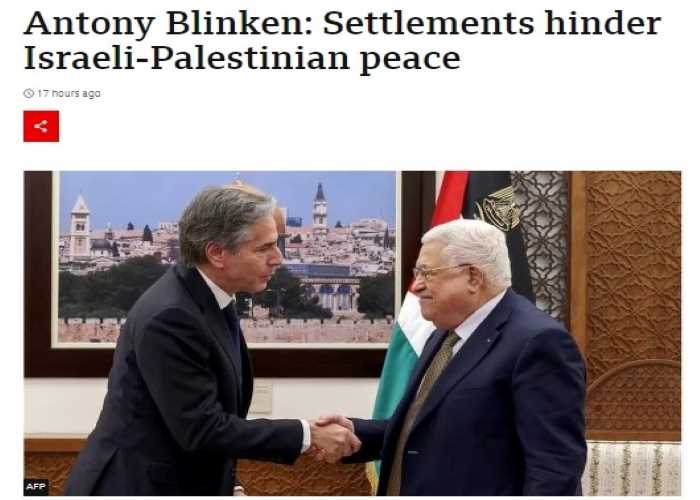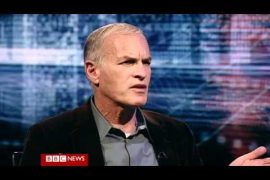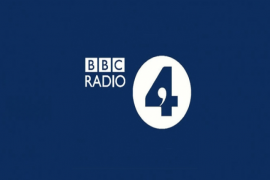This week the BBC News website published two reports by Raffi Berg relating to a visit to the Middle East by the US Secretary of State Antony Blinken.
The first of those reports appeared on January 30th (with an interesting amendment and footnote added the following day) under the headline ‘Antony Blinken in Jerusalem: Urgent steps needed for calm’ and readers find the following:
“Speaking in Jerusalem, Mr Blinken reiterated US support for a two-state solution as “the best way” to bring security to the two sides.
Israel’s new government opposes the creation of a Palestinian state. […]
Mr Netanyahu did not respond to Mr Blinken’s declaration of support for a two-state solution. His newly formed government comprises parties which resolutely oppose the concept of a Palestinian state and support the expansion of Jewish settlements on land the Palestinians claim for a hoped for state of their own.”
The second report was published on January 31st under the title ‘Antony Blinken: Settlements hinder Israeli-Palestinian peace’. Once again BBC audiences are led to believe that the main thing standing in the way of a two-state solution is the policies of Israel’s new government.
“US Secretary of State Antony Blinken has criticised Israeli settlement activity in the occupied West Bank as an obstacle to peace. […]
It underlines US opposition to a key platform of Israel’s new government, which aims to strengthen settlements. […]
Mr Blinken spoke of a “shrinking horizon of hope for the Palestinians”, which, he said, needed to change. He affirmed Washington’s backing for a two-state solution to the Israel-Palestinian conflict – an independent Palestinian state alongside Israel – saying it opposed actions by either side that would make this more difficult.
“We’ve been clear that this includes things like settlement expansion, the legalisation of outposts, demolitions and evictions, disruptions to the historic status of the holy sites, and of course incitement and acquiescence to violence.”
Mr Abbas blamed Israel for “what is happening today, because of its practices that undermine the two-state solution and violate the signed agreements”. […]
The newly-formed Israeli government resolutely opposes the concept of a Palestinian state and supports the expansion of Jewish settlements on land the Palestinians claim for a hoped-for state of their own.”
Neither of those reports addresses the obviously relevant question of which Palestinian faction is supposed to be Israel’s ‘partner for peace’ according to proponents of the two-state solution. Berg refrains from reminding readers that the “land the Palestinians claim for a hoped-for state of their own” is controlled by two separate factions – the terrorist organisation Hamas and the Fatah controlled Palestinian Authority – which have been unable to resolve the conflicts even between themselves for the past sixteen years.
The fact that Palestinians have not held elections for seventeen years, meaning that the current president and other PA officials are in fact unelected and unrepresentative (and widely seen by the Palestinian public as corrupt), is not mentioned in Berg’s account and of course neither is the fact that a significant proportion of Palestinians support terrorist organisations such as Hamas. A December 2022 survey by the Palestinian Center for Policy and Survey Research showed that:
“If Abbas and senior Hamas leader Ismail Haniyeh were to face off in elections, the survey indicated that Haniyeh would receive more support than Abbas, 54 percent to 36 percent. If Abbas does not run for re-election, the Palestinian public would prefer jailed Fatah leader Marwan Barghouti to succeed him (39 percent), followed by Haniyeh (17 percent), former leader of Fatah in Gaza Mohammad Dahlan (5 percent) and the current leader of Hamas in Gaza Yahya Al-Sinwar (4 percent).”
As is overwhelmingly the case in BBC reporting, the topic of ‘the day after Mahmoud Abbas’ – who in addition to president is also head of the PLO (the body regarded by the ‘international community’ as representing the Palestinians) and head of Fatah – and the succession battles that have already begun are not mentioned.
BBC audiences are not told that Palestinian factions such as Hamas and the Palestinian Islamic Jihad have violently opposed any peaceful “solution” for decades and that their aim is to eliminate the Jewish state. Neither are they reminded of Abbas’ repeated refusals to recognise Israel as the Jewish state: a key point in the two-state solution proposals which the BBC serially avoids.
Instead, as is all too often the case in BBC framing of the ‘peace process’, Berg erases the Palestinians from the picture – thereby presenting them as entirely lacking agency or responsibility – while once again focusing audience attentions on Israel’s new government as the sole factor supposedly standing in the way of a two state solution.
While that facile narrative may be popular in some circles, it certainly does not contribute to audience understanding of either the wider topic of the Palestinian-Israeli conflict or the steps to “restore calm” proposed by the US administration during Blinken’s visit.
Related Articles:
PARTIAL FRAMING COMPROMISES BBC REPORT ON ISRAELI POLITICS
BBC FRAMING OF THE TWO-STATE SOLUTION FOLLOWS THE USUAL TEMPLATE






Well the usual one sided reporting from the BBC no longer raises eyebrows, everyone knows it is the Palestinians who do not wish to come to the table, indeed it was only last year that Abbas declared the Oslo were invalid, but the BBC always put the blame on Israel and it has been that way for decades now. The BBC are really just the mouthpiece of Iranian propaganda, perhaps the reporters get an off-shore pension pot top up for each article of lies they devise. #defundthebbc
*Oslo Accords